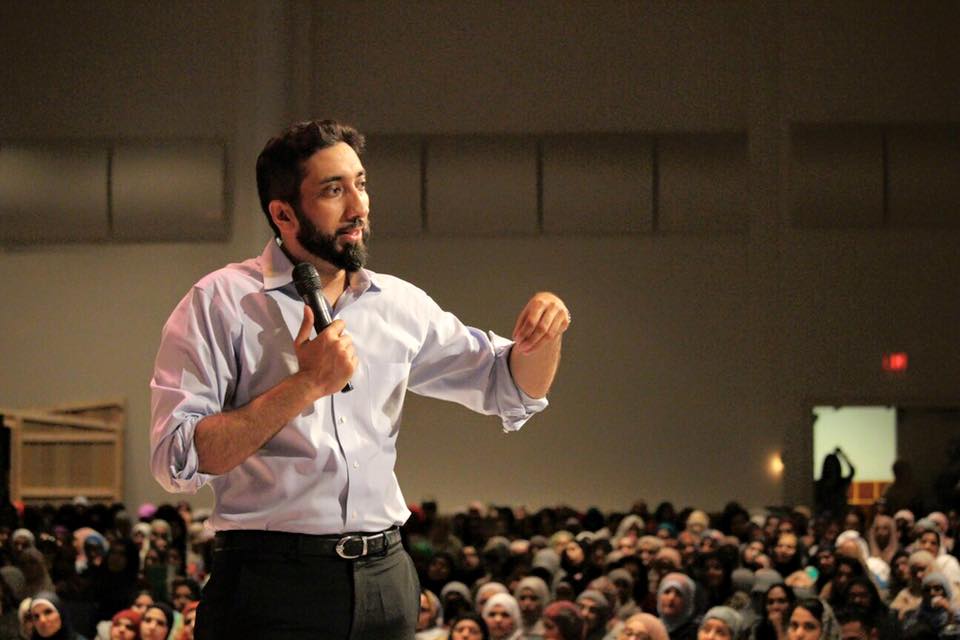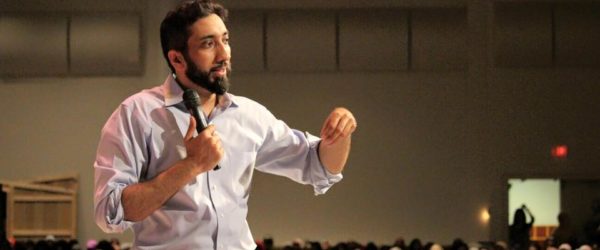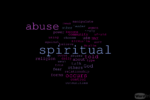Trigger warning: gender-based violence, spiritual abuse, victim-blaming, misogyny
On September 23, 2017, Omer M. Mozaffar published a Facebook post in which he wrote about “predatory behavior” on the part of Nouman Ali Khan, a Texas-based Muslim scholar and founder of Bayyinah Institute with millions of online followers. Since then, much of the Muslim internet has exploded with a wide range of reactions and discussions not only about Khan himself but also about other cases of abuse by people in positions of spiritual authority.
Fatin, Nicole, Sarabi, Shereen, Krista, and Eren try to unpack some of their thoughts here.

Nouman Ali Khan- via the Daily Pakistan.
Eren: I have never been into the “celebrity worship” type of thing (particularly when it comes to male religious figures), not only because it is flawed form of belief, but because it also requires a level of misogyny. I am not surprised when I hear cases of abuse (of all types) from religious “leaders” (there are movies about it!), but it still hits me hard and angers me that many Muslims, both men and women, are willing to accept that a man’s respectability and career are more important than his accountability in cases of abuse. Abuse and non-consensual interactions cannot be framed as purely “inappropriate interactions,” or a “minor sin,” as is often the case when we react to these situations.
Fatin: There is just so much to there’s so much to unpack here. Whether this man is guilty or not makes no difference. Over the course of the last 24 hours, in conversations with friends and family I have seen this burden of proof argument play out and it worries me. People who do not know Khan personally are willing to aggressively defend him. Women asking whether these accusers “approached him?” or “do we know they’re telling the truth?” How do we support women? How do we change our vocabulary so we aren’t shaming the victim even as we are trying to investigate claims?
Nicole: I’m one of the older ladies in the MMW group and have been a convert for a minute (I converted in 2000). The behavior of men in leadership positions in various masajid in four different countries has honestly been a significant contributing factor in (among other reasons) why i am unmosqued. I can’t tell you how many imams, faith leaders, spokes*men* i have seen who, at best, collect harems, and at worst, are sexual harassers who commit gendered violence. So I don’t want to dogpile Nouman Ali Khan (NAK) here- he is a symptom of a much larger problem affecting Muslim men in leadership. I have tea to spill for days, but that isn’t the point here, beyond saying that one of the reasons i don’t belong to a group any more is because I have been around too many male Muslim faith leaders who “collect women”.
At the same time, I also don’t want to be one of those people who demonizes Muslim men- it isn’t a coincidence that the imam in what I consider my “home masjid,” in Memphis, Tennessee, a place I haven’t lived in over a decade, is beyond reproach in terms of his interaction with the women who attend his congregation (myself included), so I am by no means saying this is a “Muslim man” problem or that all Muslim men in leadership do this. But he is one of the few who acts right, and my loyalty is there in consequence. And I think this is why a lot of people don’t speak out, or are wary to speak out against these Muslim men who don’t act right and do very bad things- the non-Muslim media are more than happy to throw stones at Muslim men whenever they can, for religious or racial reasons. But the reality is, these men are not misbehaving in a vacuum. I commend what Omer Mozaffar did in a widely shared Facebook post where NAK was called out- one of my issues in the greater Muslim communities is that misbehavior by males is often swept under the rug, while the smallest slight by a woman is often amplified. I’m tired of the days where brothers who cheat on and beat their wives can go to jummah their heads held high while a woman who does something like “be divorced” is banished for eternity.
Sarabi: Like Nicole, I’m appreciate Mozaffar posting the details online. Though many people in the comment section claim he is slandering NAK, Mozaffar’s post appears to be fair and balanced; it doesn’t seem to me that he wrote his post in haste.
I initially reacted to the news with hurt and sadness, but not surprise. Unfortunately, we live in an age where these scandals come out of the woodwork every now and then. So often, in fact, that I half-expect any prominent male celebrity to be guilty of indecent acts. I expect it, but I still don’t want it to be true. The Bill Cosby scandal is still fresh in my mind, and I grew up hearing stories of pedophilia and sexual indecency in Christian churches. The problem is not restricted to Muslim communities and I don’t think it is only an issue with male leaders. Regardless of when, where, and how it happens, I stand against it.
Krista: I also thought it was interesting to see the story come first from Omer Mozaffar. I have a lot of feelings. On one hand, I agree with Nicole that this is an important instance of men holding each other accountable and not just closing rank around a predator to protect him. I also think it’s important to see men stepping in to do the work of calling people out, work that often falls on the survivors themselves. That can be a powerful step to take as an ally.
On the other hand, part of me is admittedly resentful at the fact that a man speaking out about abuse is more likely to be believed or to be seen as “neutral” because he is less likely to have been on the receiving end of this kind of behaviour. In how many other cases have women been the ones to break the story and to find themselves immediately discredited? I couldn’t believe all the people calling for the women themselves to come forward to “prove” their experiences, as if those calling for them to come forward were ever going to be sufficiently satisfied with their narratives in order to believe them. And of course, as screenshots from conversations with survivors have come out, many people have jumped right on them to discredit them.
The other concern I had about Mozaffar’s post is that, although I appreciate his current public efforts to speak out as a way of protecting the community from further predatory behaviour on Khan’s part, he wrote about a longer private process of trying to hold Khan accountable before things were made public. I do have to wonder, were any efforts being taken during those earlier periods of private discussions to at least warn the women around him to be careful?
Eren: Absolutely! And the fact that people keep demanding the women to make public appearances, to provide “evidence” and to show who they are, really saddens me. Why do we think that we are entitled to violate the women’s safety for the sake of our questions? Why are we more willing to accept a man calling out NAK, but not willing to accept that there are survivors around who have not only been violated, shamed and perhaps even threatened, but also put in a position where where their boundaries and privacy has been pushed for a while? Why do men, particularly powerful men, have the right to be safe, to remain unaccountable and to keep their reputations even when multiple women accuse them of violence??? Do we understand the very basis of abuse? One cannot consent to one’s own abuse. That’s that. Abuse is never consensual.
Sarabi: I also worry that the US media will use this story as a means to demonize Islam, and I worry that the survivors of the sexual indecency will be harassed within and ostracized by their communities. People may be quick to jump to NAK’s defense and suggest that the woman should have been strong enough to resist the temptations, but this argument suggests that the women wanted to be abused, which is never the case. Nobody, desires to be taken advantage of. Though I don’t know enough details to assume guilt on NAK’s part, I stand with the survivors and I believe their stories.
As for what to do with the information we’ve learned from his lectures…What he allegedly did was deplorable, but that doesn’t mean his teachings are invalid. I’ll probably have to take it upon myself to do further research, but that should always be the case anyway. We shouldn’t accept one person’s interpretation of Islam. I listen to other sheikhs alongside NAK, so I’ll parse through their lectures and continue to try to find English translations of Islamic books. We don’t have to throw away everything we’ve learned. Rather, we should take this as a warning not to worship people, no matter how charismatic, and remember to make sure our information is well-sourced.
Shereen: I have also read comments about people being disappointed with NAK since the allegations arose, as they converted because of his lectures and so forth. I think it is important to separate Islam from a Muslim man or leader, no matter how famous or popular they become. Having said that, if you assume a position of popularity, then you must be aware that your conduct will be up to scrutiny and I believe try even harder to ensure your conduct is of good character. How this is handled, like responding on Facebook in my opinion is not helpful. It almost opens up the space for others who have no knowledge of the situation to pass judgement and also means any potential victims may fear their identities being shared to the masses online.
Fatin: Deen is such a personal thing. When you find that spiritual connection, you want to bottle it in a jar. For so long, if you didn’t read or speak Arabic, Islam felt inaccessible. We couldn’t read the Quran. We couldn’t understand the lectures. Then suddenly, scholars started appearing on the scene who spoke English. And they were using pop culture references and it felt cool. So we turned those scholars into celebrities. We became groupies; swarming them at conventions and wanting selfies and pictures. We excuse or brush off problematic statements or rude behaviour. We put them on pedestals. It is the lure of celebrity and power that seduces these figures. It is intoxicating. And their followers become enamoured with the spiritual connection; believing these figures are making them feel this way; rather than knowledge that comes from them. These figures are only vehicles for the knowledge.
The Quran warns believers not to worship His Prophets:
Say, O [Muhammed], ‘I am only a man like you to whom it has been revealed that your god is but one God; so take a straight course to Him and seek His forgiveness.’ And woe to those who associate others with Allah.
Nicole: Another issue I have had as more news has spilled is the power imbalance. This guy isn’t some dude. It is hard to say no to someone in power, and that makes me think that while some of these interactions appear consensual, how consensual are they when a man is as powerful in the community? What happens if you tell him no? Just look at the women getting dragged for calling him out! I remember the Nuh Keller scandal way back in the day (how many of us are old enough to remember k town divorces?) -some people looked like they were playing along or agreeing when in reality they were trying to save their skins, their families, their livelihood. That is why I feel the way I feel about NAK- the power dynamics make this more problematic. If he wasn’t in a position of power it would be different. But he is and I can see a lot of girls having a hard time telling him no when they would easily tell a rando to to eat a bag of green weenies.
Fatin: When I was living in Syria, a similar scandal happened with a very famous Shaykh. He had his group of followers, people who had pledged an allegiance to follow him. From the outside, it looks very much like a cult. You have the leader, his bodyguards, his inner circle. There are exclusive meetings and only those in the know are allowed to attend. It becomes less and less about the knowledge and more about the proximity to power. Then came the accusations of inappropriate private meetings and secret marriages. It all played out the same. Accusations became public as the followers started to leave. Then the shaykh goes public with a statement of his own denying the claim and using his knowledge of Quran and hadith to pepper his statement with authority and spiritual gravitas. The public came to his defence and the accusers and those who believe them were ostracized treated like transgressors of sin.
Shereen: This incident has made me think of a wider issue, why do we have so few female Islamic scholars and teachers? Ayesha (RA), the youngest wife of the Prophet (SA) was one of the most prolific female scholars in Islam and contributed to around 2000 ahadith, and yet now we find ourselves with few female islamic leaders to consult on Islam. I wonder with the victims of abuses of power, who are the victims going to, and who can they consult in these spaces?
Krista: I really appreciated a piece published a couple days ago by Sameera Qureshi on the HEARTfelt blog, which looks at issues around religion and sexuality. As the writer reminds us,
“As with everything on social media, this will all calm down within a few weeks, and the majority of our community will go back to living their own lives. Gender-based violence won’t matter or be a topic of importance anymore. Those working in the field will continue to fight for the rights of survivors and ways to hold perpetrators accountable. We’ll continue to stress over how many people attend training and awareness programs we’re hosting. It’s incredibly sad that methods of oppression only matter to the general public when people in the spotlight are involved.”
There have been a lot of statements in the last few days – including from this blog – about how we will always support and listen to survivors. But we need to be making those statements more regularly, perhaps especially when there’s nothing specific happening to make gender-based violence a “hot topic” in the community. To add to Shereen’s questions above, how can we make sure that we’re creating spaces where survivors always feel safe speaking out, where they always feel their concerns will be heard and valued?
Eren: And from all this, and as someone who does not only know a lot of survivors of spiritual and gendered violence, but who has also experienced sexual harassment from religious people, I can only say to those who have been abused, harassed or in any way wronged by people they trusted with their own spirituality, I believe you. MMW believes you.
To those who have never experienced these situations, particularly cis-sexual men, you have to hold the people you trust in your communities accountable. It does not matter who the person is (in this case a pretty powerful dude). The burden of proof cannot rest on survivors. You are not entitled to that. But you are entitled to ask religious leaders to be accountable for their advice, the way they profit from said advice (apparently NAK makes a lot of money from it), how they spread misogyny and patriarchal attitudes, and the instances when they are engaged in violence… particularly when that entails violence against Muslim women. Further, for those who believe NAK should be forgiven, it is totally cool if you can do so, but you are not entitled to ask survivors to do so. Similarly, forgiveness (from the relevant people) does not wash away the need for accountability, and that is our job as communities and as allies.


